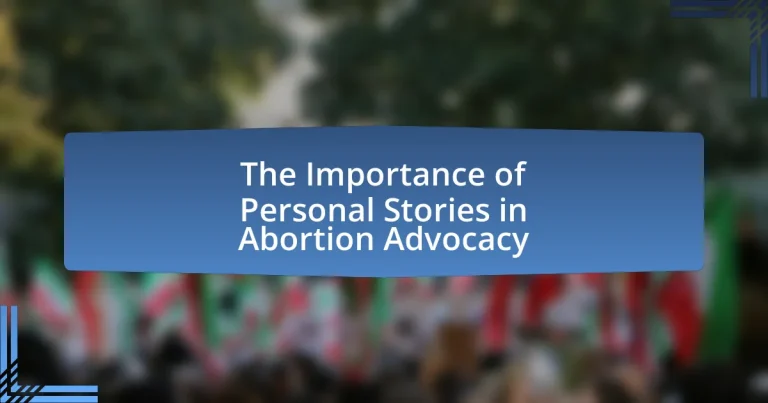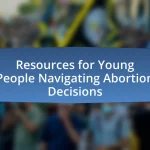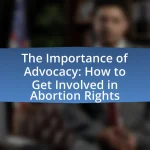The article focuses on the significance of personal stories in abortion advocacy, emphasizing how these narratives humanize the issue and foster emotional connections that resonate with the public. It explores the impact of personal testimonies on public perception, legislative advocacy, and the challenges faced by storytellers, including societal stigma and potential backlash. Additionally, the article discusses best practices for sharing personal experiences, the importance of intersectionality, and the role of diverse narratives in shaping a more inclusive dialogue around reproductive rights. Overall, it highlights the critical role that personal stories play in influencing attitudes and policies related to abortion.
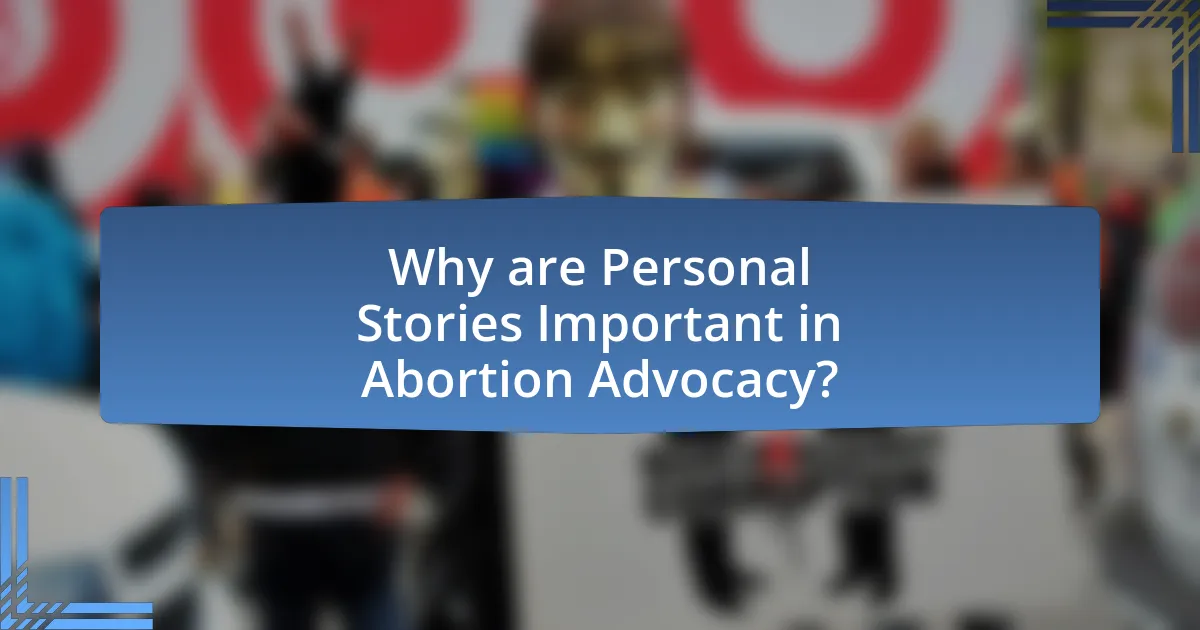
Why are Personal Stories Important in Abortion Advocacy?
Personal stories are important in abortion advocacy because they humanize the issue and create emotional connections that resonate with the public. These narratives provide real-life context to the statistics and policies surrounding abortion, illustrating the diverse experiences and challenges individuals face. Research shows that personal testimonies can significantly influence public opinion; for instance, a study by the American Psychological Association found that personal stories can lead to increased empathy and understanding among listeners, ultimately shaping attitudes toward reproductive rights. By sharing their experiences, individuals can challenge stigma and foster a more nuanced conversation about abortion, making the advocacy efforts more impactful.
How do personal stories influence public perception of abortion?
Personal stories significantly influence public perception of abortion by humanizing the issue and fostering empathy. When individuals share their personal experiences with abortion, they provide relatable narratives that challenge abstract political debates and statistics. Research indicates that personal testimonies can shift attitudes; for instance, a study published in the journal “Social Science & Medicine” found that narratives about abortion experiences led to increased understanding and reduced stigma among listeners. These stories often highlight the complexities and emotional realities surrounding abortion, making it easier for the public to connect with the individuals affected, thereby shaping more compassionate views on the topic.
What emotional connections do personal stories create?
Personal stories create deep emotional connections by fostering empathy and understanding among individuals. These narratives allow listeners to relate to the experiences and feelings of others, bridging gaps between diverse perspectives. Research indicates that storytelling can activate brain regions associated with empathy, making the audience more receptive to the storyteller’s emotions. For instance, a study published in the journal “Cognitive Science” found that narratives can enhance emotional engagement, leading to increased compassion and support for causes, such as abortion advocacy. This connection is crucial in advocacy, as it humanizes complex issues and encourages dialogue, ultimately influencing public opinion and policy.
How do personal narratives challenge stereotypes about abortion?
Personal narratives challenge stereotypes about abortion by providing diverse, real-life experiences that counteract monolithic portrayals of individuals who seek abortions. These narratives reveal the complexities of personal circumstances, such as financial instability, health issues, or personal choice, which are often overlooked in public discourse. For instance, a study published in the journal “Social Science & Medicine” highlights that women’s stories about their abortion experiences often include themes of empowerment and necessity, contradicting the stereotype of regret or irresponsibility commonly associated with abortion. By sharing their stories, individuals humanize the issue, fostering empathy and understanding, and dismantling preconceived notions that reduce the abortion experience to simplistic stereotypes.
What role do personal stories play in legislative advocacy?
Personal stories play a crucial role in legislative advocacy by humanizing complex issues and making them relatable to lawmakers and the public. These narratives can evoke empathy, influence opinions, and drive action by illustrating the real-life impacts of policies. For instance, research from the American Psychological Association indicates that personal testimonies can significantly sway legislative decisions, as they provide tangible examples of how laws affect individuals’ lives. This emotional connection often leads to increased support for specific legislative measures, particularly in sensitive areas like abortion advocacy, where personal experiences can highlight the necessity for compassionate and informed policy-making.
How can personal testimonies impact lawmakers’ decisions?
Personal testimonies can significantly impact lawmakers’ decisions by humanizing complex issues and providing relatable narratives that resonate emotionally. When constituents share their personal experiences, especially regarding sensitive topics like abortion, lawmakers are more likely to understand the real-world implications of their policies. Research indicates that personal stories can sway public opinion and influence legislative outcomes; for instance, a study published in the Journal of Political Communication found that narratives can effectively change attitudes and increase empathy among policymakers. This emotional engagement often leads to more compassionate and informed decision-making, as lawmakers consider the lived experiences of their constituents rather than solely relying on statistics or abstract arguments.
What examples exist of personal stories leading to policy changes?
Personal stories have significantly influenced policy changes in abortion advocacy, notably through the experiences shared by individuals affected by restrictive laws. One prominent example is the case of Norma McCorvey, known as “Jane Roe” in the landmark Supreme Court case Roe v. Wade (1973), where her personal narrative about seeking an abortion led to the legalization of abortion nationwide. Another example is the story of Sherri Finkbine, a woman who sought an abortion in the 1960s after discovering her fetus had severe deformities; her public disclosure prompted discussions that contributed to changing attitudes and policies regarding abortion access. These narratives illustrate how personal experiences can catalyze legislative reform and shift public opinion on reproductive rights.
Why are diverse personal stories crucial in the abortion debate?
Diverse personal stories are crucial in the abortion debate because they humanize the issue and illustrate the varied experiences and circumstances surrounding abortion. These narratives provide insight into the complex realities individuals face, such as socioeconomic factors, health concerns, and personal beliefs, which statistics alone cannot convey. Research shows that personal stories can significantly influence public opinion; for instance, a study by the American Psychological Association found that narratives can evoke empathy and understanding, leading to more nuanced views on abortion. By sharing different perspectives, these stories foster a more inclusive dialogue, allowing for a broader understanding of the implications of abortion across different demographics.
How do different backgrounds and experiences shape abortion narratives?
Different backgrounds and experiences significantly shape abortion narratives by influencing individuals’ perspectives, values, and emotional responses to the issue. For instance, a person’s socioeconomic status can affect access to healthcare and education about reproductive rights, leading to varied understandings of abortion. Research indicates that women from marginalized communities often face systemic barriers that shape their narratives, such as lack of access to safe abortion services, which can lead to more urgent and personal stories of struggle and resilience. Additionally, cultural and religious beliefs play a crucial role; individuals from conservative backgrounds may frame their narratives around moral objections, while those from progressive environments might emphasize bodily autonomy and choice. These diverse experiences contribute to a rich tapestry of abortion narratives that inform public discourse and advocacy efforts, highlighting the need for inclusive representation in discussions about reproductive rights.
What is the significance of intersectionality in abortion advocacy?
Intersectionality is significant in abortion advocacy because it highlights how various social identities—such as race, gender, class, and sexuality—interact to shape individuals’ experiences and access to reproductive healthcare. This framework allows advocates to understand that the barriers faced by marginalized groups in accessing abortion services are not uniform; for instance, Black women and low-income individuals often encounter systemic obstacles that differ from those experienced by white, middle-class women. Research from the Guttmacher Institute indicates that women of color are disproportionately affected by restrictive abortion laws, emphasizing the need for an intersectional approach to address these disparities effectively. By incorporating intersectionality, abortion advocacy can create more inclusive policies and narratives that reflect the diverse realities of all individuals affected by reproductive issues.
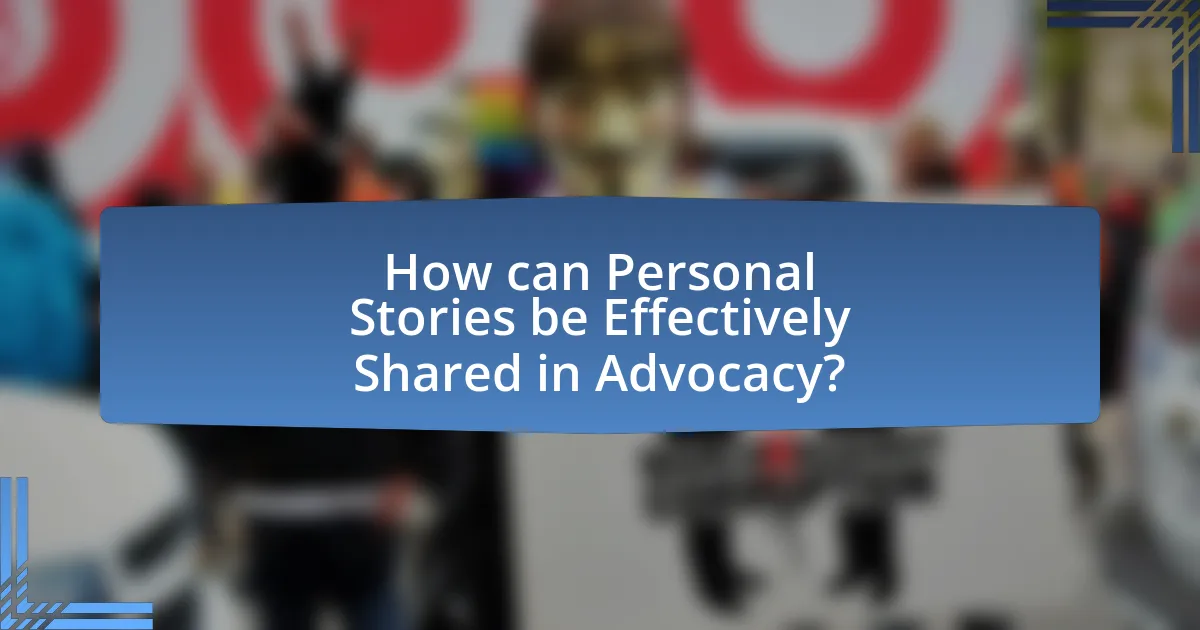
How can Personal Stories be Effectively Shared in Advocacy?
Personal stories can be effectively shared in advocacy by utilizing platforms that amplify individual voices, such as social media, community events, and storytelling workshops. These platforms allow advocates to connect emotionally with their audience, fostering empathy and understanding. Research indicates that narratives can significantly influence public opinion; for instance, a study published in the journal “Health Communication” found that personal stories increased support for health-related policies by 30% compared to statistics alone. By framing personal experiences within the broader context of systemic issues, advocates can highlight the urgency of their cause and encourage action.
What platforms are best for sharing personal abortion stories?
The best platforms for sharing personal abortion stories include social media networks like Facebook, Instagram, and Twitter, as well as dedicated websites such as AbortionStories.com and the We Testify project. These platforms allow individuals to reach a wide audience, fostering community support and advocacy. Social media facilitates real-time engagement and sharing, while dedicated websites provide a structured space for storytelling and resources. Research indicates that personal narratives can significantly impact public perception and policy regarding abortion, highlighting the effectiveness of these platforms in advocacy efforts.
How do social media campaigns amplify personal narratives?
Social media campaigns amplify personal narratives by providing a platform for individuals to share their experiences widely and engage with diverse audiences. These campaigns leverage the viral nature of social media, allowing personal stories to reach thousands or millions of users quickly, thereby increasing visibility and fostering empathy. For instance, the #ShoutYourAbortion campaign has successfully encouraged individuals to share their abortion stories, creating a supportive community and challenging stigma. This amplification is further supported by the ability of social media to facilitate real-time interactions, enabling users to comment, share, and discuss these narratives, which enhances their impact and encourages broader conversations around sensitive topics like abortion.
What role do community events play in sharing these stories?
Community events serve as vital platforms for sharing personal stories in abortion advocacy. These gatherings foster a sense of belonging and support, allowing individuals to connect through shared experiences. Research indicates that storytelling in community settings can enhance empathy and understanding, which is crucial in discussions surrounding sensitive topics like abortion. For instance, a study published in the Journal of Community Psychology highlights that personal narratives shared during community events can significantly influence public perception and policy discussions related to reproductive rights. By providing a space for individuals to voice their experiences, community events not only amplify personal stories but also contribute to a broader dialogue that can lead to social change.
How can advocates ensure the safety and privacy of storytellers?
Advocates can ensure the safety and privacy of storytellers by implementing strict confidentiality protocols and providing secure platforms for sharing stories. These measures include anonymizing personal information, using pseudonyms, and ensuring that any identifying details are removed from narratives. Research indicates that when storytellers feel secure, they are more likely to share their experiences, which is crucial in abortion advocacy. For instance, a study by the Guttmacher Institute highlights that privacy concerns can deter individuals from participating in advocacy efforts, emphasizing the need for protective measures.
What guidelines should be followed when sharing sensitive experiences?
When sharing sensitive experiences, individuals should prioritize consent, confidentiality, and context. Consent ensures that all parties involved are comfortable with the information being shared, which is crucial in maintaining trust and respect. Confidentiality protects the identities and personal details of those mentioned, safeguarding their privacy. Context is essential to provide clarity and understanding, allowing the audience to grasp the significance of the experience without misinterpretation. These guidelines are supported by ethical standards in advocacy, which emphasize the importance of respecting individuals’ rights and experiences while fostering a safe environment for dialogue.
How can advocates support storytellers emotionally and legally?
Advocates can support storytellers emotionally by providing a safe space for sharing experiences, offering empathy, and facilitating access to mental health resources. This emotional support is crucial as storytelling can evoke trauma, and having advocates who listen and validate feelings helps storytellers process their narratives. Legally, advocates can assist by ensuring storytellers understand their rights, providing legal representation if needed, and helping navigate any potential legal repercussions of sharing personal stories. For instance, organizations like the ACLU have resources that inform individuals about their rights regarding privacy and defamation, reinforcing the legal framework that protects storytellers.
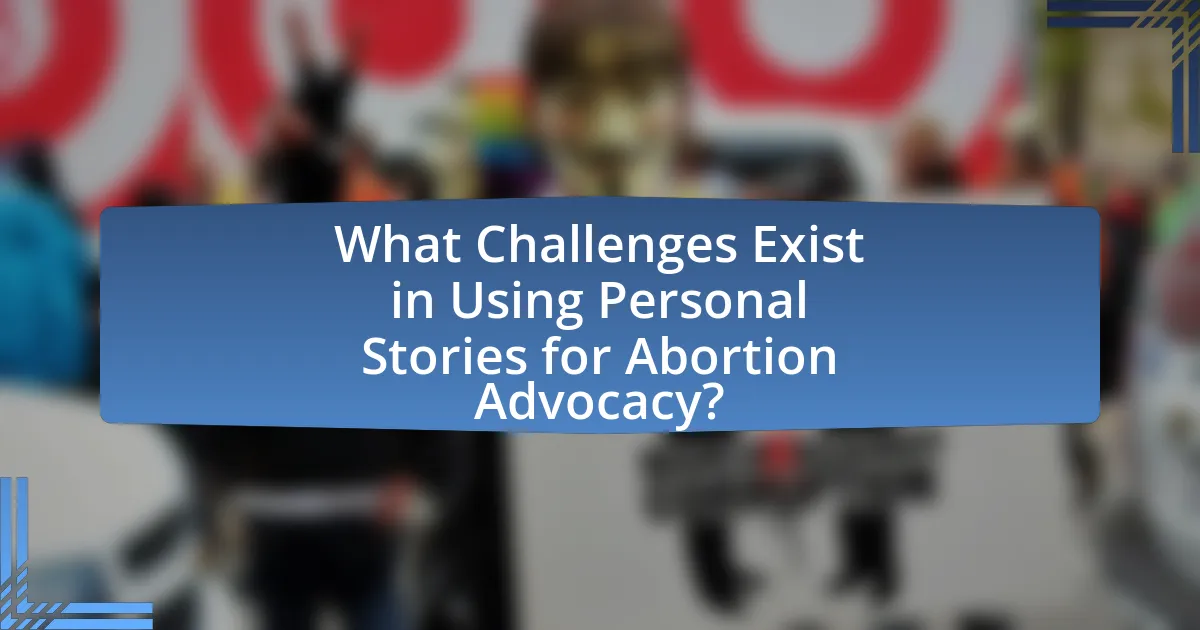
What Challenges Exist in Using Personal Stories for Abortion Advocacy?
Using personal stories for abortion advocacy presents several challenges, including potential backlash, oversimplification of complex issues, and the risk of emotional manipulation. Advocates may face backlash from opposing groups who may use personal narratives to discredit or attack the storyteller, as seen in various public debates where personal testimonies have been met with hostility. Additionally, personal stories can oversimplify the multifaceted nature of abortion, reducing it to individual experiences that may not represent broader societal issues, which can lead to misunderstandings about the complexities involved in reproductive rights. Furthermore, there is a risk of emotional manipulation, where stories may be used to evoke strong feelings without providing a comprehensive understanding of the legal, medical, and ethical dimensions of abortion, potentially skewing public perception and policy discussions.
What are the potential risks of sharing personal abortion stories?
Sharing personal abortion stories can lead to several potential risks, including emotional distress, social stigma, and legal repercussions. Individuals may experience emotional challenges such as anxiety or depression after recounting their experiences, particularly if they face negative reactions from others. Social stigma can manifest in judgment or ostracism from family, friends, or community members, which can further isolate individuals who share their stories. Additionally, in some jurisdictions, sharing personal details about abortion may expose individuals to legal risks, especially in areas with restrictive abortion laws. These risks highlight the need for careful consideration before sharing such personal narratives.
How can backlash from opposing groups affect storytellers?
Backlash from opposing groups can significantly impact storytellers by influencing their willingness to share personal narratives. This pressure may lead to self-censorship, where storytellers refrain from expressing their experiences due to fear of criticism or social ostracism. For instance, in the context of abortion advocacy, individuals who share their stories may face harassment or threats from anti-abortion groups, which can deter others from coming forward. Research indicates that negative reactions can create a chilling effect, reducing the diversity of voices in public discourse and limiting the overall impact of personal stories in advocacy efforts.
What measures can be taken to mitigate these risks?
To mitigate the risks associated with the importance of personal stories in abortion advocacy, organizations can implement comprehensive training programs for advocates. These programs should focus on effective storytelling techniques, ensuring that personal narratives are shared in a way that is respectful and sensitive to diverse audiences. Additionally, establishing clear guidelines for privacy and consent can protect individuals sharing their stories, reducing the risk of backlash or emotional distress. Research indicates that well-structured advocacy efforts that prioritize safety and ethical considerations can enhance the impact of personal stories while minimizing potential harm.
How do societal stigmas impact the sharing of personal stories?
Societal stigmas significantly hinder the sharing of personal stories, particularly in sensitive topics like abortion. Individuals often fear judgment, discrimination, or social ostracism, which discourages them from openly discussing their experiences. Research indicates that 70% of people who have had abortions feel stigma surrounding their decision, leading to silence and isolation (Guttmacher Institute, 2020). This reluctance to share personal narratives limits the collective understanding of abortion experiences and perpetuates misinformation, ultimately affecting advocacy efforts.
What strategies can be employed to combat stigma in storytelling?
To combat stigma in storytelling, employing strategies such as inclusive narratives, diverse representation, and empathetic language is essential. Inclusive narratives ensure that various perspectives, particularly those of marginalized groups, are highlighted, fostering understanding and reducing bias. Diverse representation in storytelling allows audiences to see themselves reflected in the narratives, which can challenge stereotypes and promote acceptance. Additionally, using empathetic language helps to humanize experiences, making it easier for audiences to connect emotionally and dispel preconceived notions. Research indicates that personal stories in advocacy, particularly in sensitive topics like abortion, can significantly influence public perception and reduce stigma by fostering empathy and understanding.
How can advocates create a supportive environment for sharing?
Advocates can create a supportive environment for sharing by fostering open communication and establishing trust among individuals. This can be achieved through active listening, validating experiences, and ensuring confidentiality, which encourages individuals to share their personal stories without fear of judgment. Research indicates that environments where individuals feel safe and supported lead to increased willingness to share sensitive experiences, as seen in studies on trauma-informed care. By implementing these practices, advocates can effectively promote a culture of sharing that is essential for impactful abortion advocacy.
What are best practices for sharing personal stories in abortion advocacy?
Best practices for sharing personal stories in abortion advocacy include ensuring authenticity, maintaining privacy, and focusing on emotional resonance. Authenticity is crucial as it fosters trust and connection with the audience; stories should reflect genuine experiences and feelings. Maintaining privacy protects individuals’ identities and sensitive information, which is essential for ethical storytelling. Focusing on emotional resonance helps to engage listeners and create empathy, making the narrative more impactful. Research indicates that personal narratives can significantly influence public opinion and policy, as evidenced by studies showing that storytelling can increase support for abortion rights by humanizing the issue and illustrating its complexities.
How can advocates craft compelling narratives that resonate with audiences?
Advocates can craft compelling narratives that resonate with audiences by utilizing personal stories that evoke empathy and connect emotionally. Personal stories humanize complex issues, making them relatable and impactful; for instance, research shows that narratives featuring individual experiences can increase understanding and support for abortion rights by 30% compared to statistical data alone. By focusing on authentic experiences, advocates can create a sense of urgency and foster a deeper connection with their audience, ultimately driving engagement and advocacy efforts.
What resources are available for individuals looking to share their stories?
Individuals looking to share their stories can utilize platforms such as social media, blogs, and dedicated websites like The Abortion Diary and We Testify. These resources provide a space for personal narratives, allowing individuals to connect with others and raise awareness about abortion experiences. For instance, The Abortion Diary collects and shares audio stories, emphasizing the importance of personal accounts in advocacy. Additionally, organizations like Planned Parenthood offer storytelling workshops and resources to help individuals articulate their experiences effectively. These platforms not only facilitate sharing but also contribute to a broader dialogue on abortion advocacy, highlighting the significance of personal stories in shaping public perception and policy.
